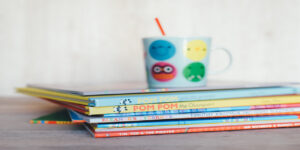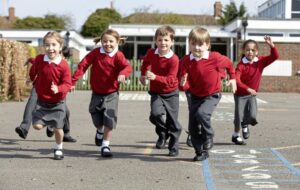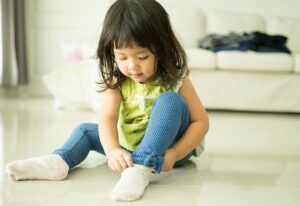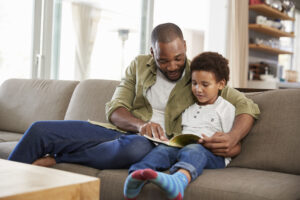Some of you may be worried about your child starting primary school in September, particularly now that they are missing valuable weeks in their pre-school classes due to Covid-19 restrictions. Heather Keys, Pre-School Room Leader in our Ashbourne creche, has written this weeks blog post which should help you manage the transition from pre-school to primary school.
Transition from Pre-school to Primary School
The transition from preschool to primary school can be a hard and daunting experience for all involved. It’s hard for parents as they begin to realise just how quickly time is going by and they realise that their babies just aren’t babies anymore. They begin to question themselves with things such as “should I have waited another year”, “are they too young”, “will they be able for school”, “are they ready” - etc. It’s hard on children as they have a new environment, new peers, new teachers, new routine, new uniform, a longer day, and some children may even have to take a bus to school. There’s a lot of ‘new’ all at once. While this has absolutely no effect on some children and they just take it in their stride and get on with it, there are other children who really struggle with change and need a little extra preparation and support. That is okay. Children are not a one size fits all - they learn things at their own speed. Some can do things that others haven’t mastered yet. They have different likes and dislikes and it is our job as practitioners and parents to create a safe environment and strong relationships where each child is supported and encouraged to express themselves so that they feel valued and their interests, fears, worries and hopes and are listened to and responded to.
They begin to question themselves with things such as “should I have waited another year”, “are they too young”, “will they be able for school”, “are they ready” - etc. It’s hard on children as they have a new environment, new peers, new teachers, new routine, new uniform, a longer day, and some children may even have to take a bus to school. There’s a lot of ‘new’ all at once. While this has absolutely no effect on some children and they just take it in their stride and get on with it, there are other children who really struggle with change and need a little extra preparation and support. That is okay. Children are not a one size fits all - they learn things at their own speed. Some can do things that others haven’t mastered yet. They have different likes and dislikes and it is our job as practitioners and parents to create a safe environment and strong relationships where each child is supported and encouraged to express themselves so that they feel valued and their interests, fears, worries and hopes and are listened to and responded to.
What Is School Readiness?
School readiness is term that we, as practitioners, use quite a lot as the children get closer to starting school. But what does school readiness actually mean? School readiness just means that children are ready for school, families are ready to support their child’s learning and that schools are ready for children. It means ensuring that the children possess the skills, knowledge and attitudes necessary to thrive in school and in their future. Some of the essential ingredients of school readiness that we practitioners tend to work on and help children to develop are their physical, cognitive, social, and emotional skills.  We work on these all year long and they are incorporated into the child’s daily activities so that they don’t even notice that they are working on these skills. I know that quite often parents worry that their child just isn’t quite there yet in terms of the skills they possess but it is important to remember that a child’s development unfolds in a predictable sequence and at an individual rate. Although we try our hardest to prepare children for transition to school, they are never going to be 100% ready and that’s completely okay. It’s also important to remember that they children are still so young. They may not get it right all the time and they will make mistakes. The main thing to focus on is supporting the child through this transition and preparing them as much as we can so they are as ready as they can be for this new experience and stage in their lives.
We work on these all year long and they are incorporated into the child’s daily activities so that they don’t even notice that they are working on these skills. I know that quite often parents worry that their child just isn’t quite there yet in terms of the skills they possess but it is important to remember that a child’s development unfolds in a predictable sequence and at an individual rate. Although we try our hardest to prepare children for transition to school, they are never going to be 100% ready and that’s completely okay. It’s also important to remember that they children are still so young. They may not get it right all the time and they will make mistakes. The main thing to focus on is supporting the child through this transition and preparing them as much as we can so they are as ready as they can be for this new experience and stage in their lives.
Maintaining A Strong and Supportive Relationship
As mentioned above, relationships play an important part in ensuring a smooth transition from pre-school to primary school. Children flourish when they feel valued, cared for and when their opinions matter and are listened to. It is important that children have a good support network when transitioning from pre-school to primary school. Maintaining pre-school friendships over the summer months with some of your child’s peers who will be attending the same school as your child is one way to establish this. Pre-school friendships are helpful in developing social and emotional skills, increasing a sense of belonging and decreasing stress. Friendships can contribute significantly to the development of social skills, such as being sensitive to another’s points of view, learning the rules of conversation, and age-appropriate behaviours. Children struggle to learn if they do not feel comfortable and valued within the environment. Having strong relationships with their peers is one of the many factors that helps students feel welcome. Some children are nervous about the transition, but they know they will be staying with some of their friends, which helps to ease their fears about the transition. Don’t get me wrong, they will still probably be nervous in September, but less so because they will have a few warm faces who are happy to see them when they step into that junior infant classroom for the first time. It can also beneficial if the child knows older children such as brothers, sisters, neighbours who attend the same school. It can help the child to know that they are not alone in this new situation and that they have a familiar face nearby.
Encourage Independence
Developing independence is a vital factor in a child’s development and supports preschool children in becoming school ready. Promoting independence can help children to learn resilience, confidence and self-assurance. Children often enjoy gaining independence in everyday tasks and most go through the “I can do it myself” phase. Encourage your child to do things for themselves, believe me I understand how much easier and quicker it is if you just do things for them but by supporting them to do it will help them learn the critical skills needed to be independent. For example, encouraging the child to dress themselves is a big step towards independence.  Pre-school children should be supported in putting their own coats and shoes on to go outside. This will help children to problem solve and feel confident in themselves. Fastenings on coats and shoes can be difficult for the child to manipulate, however you can help to get started and encourage the child to complete the last step such as pulling the zip up, fastening the buttons etc. There are many other ways you can enable your child to be independent such as letting them choose their own clothes and choosing their own snack for their lunch boxes. This supports the child in evaluating their likes and dislikes, whilst offering some self-control over their choices. Tidying up toys, helping to cook dinner, helping to set the table for meals, serving themselves at mealtimes - these are other ways to help promote independence within children. Through tasks such as these mentioned above the children are developing physical, cognitive and social and emotional skills without even realising that they are doing it, they just think that they are helping out or doing something fun.
Pre-school children should be supported in putting their own coats and shoes on to go outside. This will help children to problem solve and feel confident in themselves. Fastenings on coats and shoes can be difficult for the child to manipulate, however you can help to get started and encourage the child to complete the last step such as pulling the zip up, fastening the buttons etc. There are many other ways you can enable your child to be independent such as letting them choose their own clothes and choosing their own snack for their lunch boxes. This supports the child in evaluating their likes and dislikes, whilst offering some self-control over their choices. Tidying up toys, helping to cook dinner, helping to set the table for meals, serving themselves at mealtimes - these are other ways to help promote independence within children. Through tasks such as these mentioned above the children are developing physical, cognitive and social and emotional skills without even realising that they are doing it, they just think that they are helping out or doing something fun.
Play
Play is an essential part of childhood; play has a positive impact on children’s overall development. There are many positive benefits of play on a child’s social/emotional, physical, cognitive, language and literacy development. Play enhances children’s creativity and problem-solving. It contributes to the development of self-regulation and social skills such as turn-taking, collaboration and following rules, empathy, and motivation. Social and dramatic play help children to better understand and cope with others’ perspectives. Outdoor play helps to promote children’s physical well-being, attention, conflict resolution, coordination, muscle development, and healthy weights. Adding literacy-related materials to dramatic play areas, increases reading and writing activities and use of more varied language. – dress up and acting out events and stories aid in story comprehension and develop a stronger theory of mind, the understanding that others have different feelings, thoughts, views and beliefs. It is important to remember that preparing children for school doesn’t mean getting them to sit down at a table and making sure that they can write their names, spell their own names, know all the letters in the alphabet, know all the numbers from 1-100. I’m not saying that these things aren’t important, they are, but a child doesn’t necessarily have to be able to master them all before they start school. Children very much learn through play and learn by doing.
There can be a lot of hype and anxiousness surrounding school readiness, but you don’t have to go overboard to prepare your child for the transition from preschool to primary school. Chances are you are helping them to develop and prepare without even realising it with your daily interactions with your child, in the activities you do with them and continuing to support and nurture the relationship you have with them. Below are 4 easy things you can do at home to further help your child to prepare to take the big step from Preschool to school.

~ Author: Heather Keys, Pre-School Room Leader, Ashbourne ~
© 2026 TIGERS CHILDCARE ALL RIGHTS RESERVED | Web design + build by Sebdigital